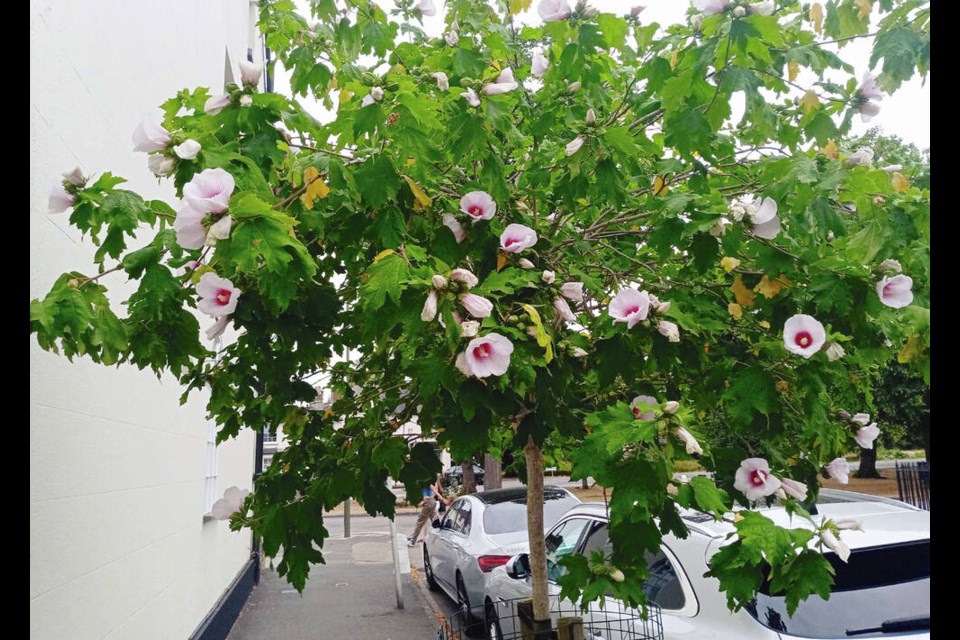Dear Helen: This question is from my brother, who lives in the Borough of Barnet in North London, England. I’ve told him about your column. “Two years ago, our local council planted the tree in the attached photo around the corner from us, but neither they nor their contractors can tell me what it is. The tree is beautiful in bloom. We’d like to plant one ourselves. Can you ask your garden columnist to identify it?”
K.G.
Your brother’s photo shows a Rose of Sharon (Hibiscus syuriacus) grown in tree form. This plant is known almost exclusively here as a deciduous shrub, around three metres tall, with showy, hollyhock-like summer and early autumn flowers.
Rose of Sharon’s naturally vigorous growth and vase-like shape makes it easily grown as a multi-stemmed shrub; however, that growth can also be thinned to create a small, single-stemmed tree.
Hibiscus syriacus is appealing for its long flowering period. It thrives in a well drained but humus-rich soil, in full sun to part shade.
Curious to find out whether the plants might be available here in tree form, I consulted the helpful people at Russell Nursery in North Saanich, who replied that they “don’t see standard (tree) form Rose of Sharon here at the nursery. Also, if it was available, we might be inclined not to order it. Rose of Sharon is a difficult plant to keep looking good in the nursery.”
This is true of a number of plants that become difficult to find because, when they are held in nursery pots, it’s hard to keep them from looking tatty.
Dear Helen: A potted butternut squash, on our sunny deck, has produced plenty of flowers, but as the squashes start to form they turn yellow and drop off. I water regularly, and fertilize.
L.I.
This is a common issue, with both summer and winter squash. The cause is that the female flowers have not been pollinated. Without pollination, little squashes begin to grow but then shrivel and fall off.
Each squash plant bears both female and male flowers. Normally, bees and other pollinators move pollen from the male to the female blooms to begin the pollination process as the pollen moves down to fertilize the female’s ovary.
A lack of pollinating insects is a common cause of failure for squash to develop. The useful work of these insects is sometimes prohibited or at least inhibited by wind, rain, and/or cold — conditions that, even in the presence of pollinators, can affect the pollen’s quantity, quality, and movement into a female bloom. Heat and/or drought can cause blooms to die off quickly, before fertilization can occur.
This growing season has not been ideal for squash. The prolonged cold delayed planting and growth to flowering size. I’ve noticed among my zucchinis some misshapen fruit, a sign of incomplete fertilization of the female flower.
Some gardeners, as soon as they see baby fruits forming and then drying off, take on the role of bees by picking a male flower (long straight stem, yellow pollen at centre), pulling back the petals, and dabbing its pollen onto the centre of several female flowers (shorter stem, a small bulge at the bloom base). That little bulge is a baby fruit ready to begin developing once fertilization is complete.
This hand pollinating is too late now for winter squash but not too late for summer squash.
GARDEN EVENTS
Dahlia show. The Victoria Dahlia Society is holding its 76th Annual Flower Show on Saturday, from 1 to 4 p.m. and Sunday, Aug. 28, from 12 to 4 p.m. The show is at Prospect Lake Community Hall, 5358 Sparton Road, Victoria. Admission is free. Come and view a dazzling display of dahlias grown by club members.
Russell Nursery events (1370 Wain Rd., North Saanich)
* Saturday at 10 a.m. or 2 p.m. Join co-owner Sue Tice for a behind-the-scenes tour of the nursery. Find out how perennials, shrubs and trees are potted, and visit the places where plants are grown to saleable size. Register for the tour by phoning 250-656-0384 or email [email protected].
* Sunday, 12 to 3 p.m. A drop-in question and answer time with David Spencer from Applied Bionomics. Learn how to use beneficial insects and mites as well as other bio-controls to deal with garden pests. No need to register for this.


